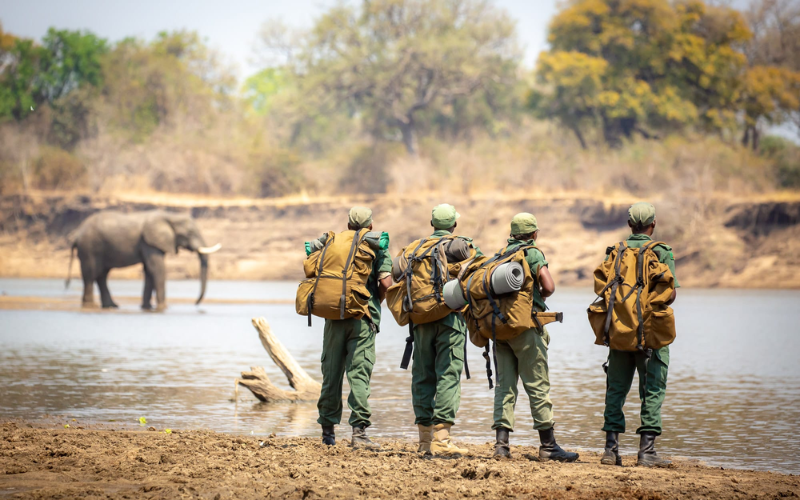More than 1,000 rangers from Kenya and 23 other African countries laced their boots last Saturday for a 21km race aimed at raising funds and awareness for conservation.
From the shadow of Mt Kenya to Uganda’s thundering Murchison Falls and Zambia’s expansive Kafue National Park, the 2025 Wildlife Ranger Challenge unfolded across 24 African nations. The annual half-marathon, now in its sixth year, has become a continental symbol of the resilience, courage, and purpose that define the ranger profession.
The run followed the September 17–21 African Ranger Conference at Lewa Wildlife Conservancy in Meru, which underscored the urgent need to professionalise the sector.
At dawn on September 20, participants strapped on 22kg backpacks and set off across savannahs, forests, and coastlines in a synchronised display of endurance and solidarity. While rangers competed on the ground, thousands of supporters from London to Lagos and Cape Town to Copenhagen joined virtually, running in parallel and fundraising for the cause.
Global Support
In a video address, His Royal Highness The Prince of Wales, patron of Tusk—the event’s co-organiser—hailed the rangers as “educators, leaders, mentors, and protectors of cultural heritage” and warned that without them, “there is no path to protecting nature, no future for the wildlife and natural world we all cherish.”
Since its launch in 2020, the Wildlife Ranger Challenge—run by Tusk and the Game Rangers Association of Africa (GRAA) with support from Mark Scheinberg—has raised more than $21 million (Sh2.7 billion). The initiative has connected over 11,500 rangers with supporters in 90 countries and grown into the largest continent-wide celebration of the profession.
The Realities of Rangering
Despite their heroism, rangers work under harsh conditions. A recent survey found that half have no health insurance, 60 per cent lack long-term disability cover, and most earn less than half the salary of local police officers.
“Most are not well motivated. They lack field equipment, food rations, and social welfare,” said Zionne Kasungu, a ranger at Malawi’s Kasungu National Park.
The Lewa conference revealed that fewer than 300,000 rangers are active globally, including about 60,000 in Africa. Experts estimate 1.5 million are needed worldwide to meet conservation goals.
“Rangers are integral members of their communities, preserving ecosystems that support all life,” said Nick Bubb, CEO of Tusk. “They are pivotal to the sustainability of our planet. The Challenge honours their bravery while urging investment in their future.”
Calls for Reform
Rangers used the occasion to demand better welfare: job security, adequate insurance, trauma response, and legal support. They stressed the importance of mental health services, resilience training, and minimum safety standards, especially in conflict zones.
“It is tough. The rangers work 24 hours, because wildlife do not have weekends or nights off,” said Edward Nderitu, head of anti-poaching at Lewa Conservancy.
Training was also highlighted, with calls for continuous mentorship, leadership development, and alignment with global competencies. Stakeholders urged recruitment of more women, youth, and indigenous people, alongside policies tailored to the needs of female rangers.
Crucially, they called on governments to legislate and budget for ranger welfare, recognising the role as an essential public service.
Challenge and Congress
This year’s event coincided with the African Ranger Congress, also held at Lewa. While the Challenge galvanises public support, the Congress tackles policy, professionalisation, and long-term sector reform.
“As climate change intensifies and illegal wildlife trade escalates, the urgency to professionalise Africa’s ranger workforce has never been greater,” said Mike Watson, CEO of Lewa.
Prior to the race, teams trained for 10 weeks, completing time trials, push-ups, sit-ups, and quizzes across swamps, savannahs, rainforests, and high-altitude moorlands. Encounters with elephants, lions, and buffalo were not uncommon. For many, the Challenge mirrored their daily realities—hardship, resilience, and unwavering commitment.
Today, ranger teams from more than 80 protected areas participate, from marine units nurturing coral reefs in the Indian Ocean to gorilla trackers in Uganda’s Bwindi Forest, aerial patrols in Kenya’s Tsavo, and all-female squads in Zambia.
The Wildlife Ranger Challenge, born out of the Covid-19 pandemic to keep rangers employed, has evolved into an annual movement of solidarity, connection, and celebration. As rangers continue to safeguard Africa’s wildlife under extreme conditions, the world is being called upon to safeguard them in return.
